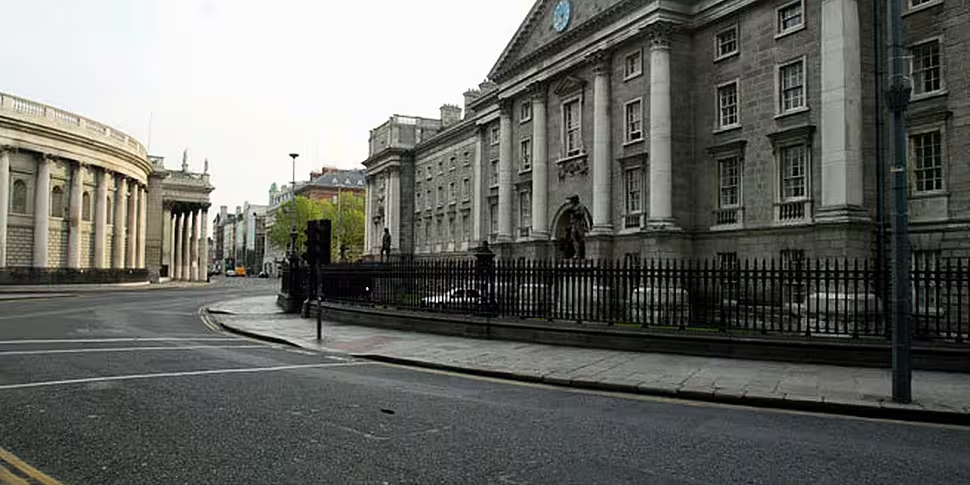Last week, Trinity College Dublin announced that it had decided to sell off all of its investments in companies whose primary business is the extraction of fossil fuels.
This is no small amount of money. Trinity’s endowment fund dates back 200 years, and currently has €6 million tied up with oil companies.
The decision makes the university the first on this island to divest in this way. While the decision itself was the result of an impressive 15 month campaign run by students in the college, it coincided with a major global announcement on divestment in London.
677 institutions from around the world have pledged to divest fossil fuels as part of the global ‘Divest-Invest’ campaign. This group includes governments, banks, pension funds, health groups, schools and religious bodies. Together they represent $5 trillion in assets.

Divest-Invest
In January 2014, the Divest-Invest campaign launched with 17 foundations and $1.8 billion of assets under management. Since then, the movement has worked on encouraging everyone from individuals to Governments to stop investing in fossil fuels.
They make an ethical, legal and financial argument for doing so.
They say that the world cannot continue to invest in companies “that are accelerating climate change, which disproportionately affects the poor and profoundly impacts the environment.”
Furthermore they rely on a legal argument about ‘fiduciary duty’ that they say compels certain bodies - particularly charities - to halt fossil fuel investment.
Finally it is their position that high carbon investments will ultimately end up costing more money than they yield, partly through fines but also because, if unabated, climate change is predicted to wipe out a large portion of global GDP.
Tipping the balance
The campaign has enjoyed some considerable success. On the one-year anniversary of the Paris climate agreement, a report published on Monday found that the value of organisations committed to ditching their holdings in fossil fuels is now bigger than all listed oil and gas companies.
Oil and gas firms are worth approximately $4.5 trillion dollars according to Bloomberg. This is slightly less than the $5 trillion in assets committed to divestment.
The companies responsible for the bulk of this include Amalgamated Bank, Aegon, Allianz SE and the Rockefellar Foundation, as well as the cities of Berlin, Oslo and Washington D.C.
Speaking in the wake of the report, outgoing UN secretary general Ban Ki-moon welcomed the news, while May Boeve of 350.org said: "As we enter the final weeks of 2016, the hottest year in history, the success of the divestment movement is undeniable."
Ireland’s fossil fuel investments
Besides Trinity College however, there is little reason to celebrate that success on these shores. The Irish State currently invests considerable sums of money in companies dedicated to extracting and burning fossil fuels.
The Irish Strategic Investment Fund (the successor to the National Pension Reserve Fund) has investments of over €130 million of taxpayer money in fossil fuel companies. In the past, these investments have included TransCanada which is behind the proposed Keystone XL pipeline; Peabody Energy, a company that claims climate change is not real; and various companies engaged in the business of fracking.

Image: Nati Harnik AP/Press Association Images
According to investigations carried out by Trocaire, there are indications that the combined carbon emissions of the ISIF’s investments could be more that those coming from the Irish State itself.
These investments do not even appear to make financial sense. Only last month, a report commissioned by Trocaire argued that retaining fossil fuel investments cost the ISIF around €100 million in the past three years. Switching to clean energy companies would have yielded around €22 million more over the course of 2015.
According to Eamon Meehan, the Director of Trocaire: "Current climate impacts are already too much for the communities that we work with. Today, 9.7 million people in Ethiopia are in need of food aid due to drought, exacerbated by climate change and El Niño.
"To fail to deliver on the commitments made in Paris is to knowingly condemn these women, men and children to even further suffering. This is something we simply cannot accept. Divesting the Ireland Strategic Investment Fund of its investments in fossil fuels would send a powerful signal of intent to people in Ireland, and people around the world, that Ireland is serious about the commitments made in Paris last year."

The ISIF have previously confirmed that holdings in fossil fuel companies are legacy investments and are being reviewed on a phased basis. It also should be noted that they invest in more 'green' companies than other similar funds around the world.
National Mitigation Plan
However, as long as the State retains a financial stake in companies that are changing the global climate, it is hypocritical of the Government or any Minister to boast about the country’s commitment to a cleaner, greener future.
All of this heaps more pressure on Minister Denis Naughten. He is due to publish a National Mitigation Plan which will set out Ireland’s path to meeting green house gas commitments. We are currently due to miss those targets as outlined.
"President Trump is saying very concerning things about his intentions with regard to climate action," says Phil Kearney, Chair of the An Taisce Climate Change Committee. "In Ireland, on the other hand, politicians are saying lots about our commitment to climate change, but in reality we’re moving in the wrong direction.
"Carbon emissions and energy use rose in Ireland last year. The credibility of Minister Naughten’s National Mitigation Plan due to be published this week will be seriously in question if it fails to chart a pathway to Ireland meeting the commitments it signed up to in Paris."
Trinity College have proven themselves to be on the right side of history. Will the State follow suit?









